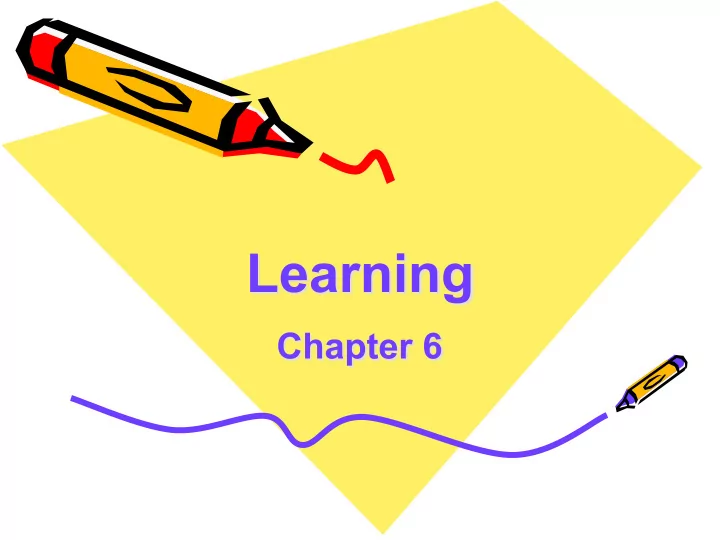

Learning Chapter 6
Learning Principles • Denied existence of entity called personality • Disregards unconscious motivation. • Behavior can be controlled by its consequences, by reinforcer that follows the behavior.
Learning Principles • Behavior is controlled and modified by variables that are external to organism. • Conditioning involves substituting one S for another. It will not occur without reinforcement.
Learning Theories - Ivan Pavlov • Classical Conditioning Paradigm - UCS (meat) = UCR (saliva) - Neutral S (bell) + UCS (meat) = UCR (saliva) - After pairing, CS (bell) = CR (saliva • Importance of Classical Conditioning in Emotions
Classical Conditioning Classical Pavlov: conditioning paradigm
Classical Conditioning
Learning Theories - B.F. Skinner • Thorndike ’ s Law of Effect • Terms of operant conditioning = learning in which voluntary behavior is affected by its consequences - Reinforcement: primary; secondary; - Positive / Negative reinforcement - escape conditioning - avoidance conditioning - Punishment - Extinction - Generalization/ discrimination - - Shaping – Superstitious behavior – Spontaneous recovery – return of conditioned R
Operant Conditioning Skinner box
Operant Conditioning • Reinforcement occurs after - • Continuous reinforcement • Partial (intermittent) reinforcement • Schedules of reinforcement - • Fixed ratio = number of times fixed • Variable ratio = number of times varies • Fixed interval = space of time fixed • Variable interval = space of time varies
Learning -Behavior Modification Programs • Behavior modification is the practical application of operant conditioning. • Behavior Modification - – Behavior to be changed – Baselines – Rewards – Charts – Review
Evaluation of Skinner • Ignored: – Cognitive influences – Biologically disposed patterns – Results of excessive rewards • Useful in: – Education – Interactive media – Business – Parenting – Self-improvement
Learning by Observation Albert Bandura • Possible involvement of “ mirror neurons ” • Latent learning without reinforcement • Observational learning
Learning by Observation Albert Bandura • Film – Bobo Doll
Learning by Observation • Prosocial effects - models • Antisocial effects – – Abusive parents – Wife-battering husbands – Violence in media
Chapter 6 - Review • Classical conditioning • Operant conditioning • Reinforcement – continuous; partial schedules • Terms – – Reinforcement: positive; negative – Punishment – Extinction – Generalization / discrimination – Shaping – Superstition – Spontaneous recovery • – Behavioral Modification Learning by observation - Bandura
Recommend
More recommend